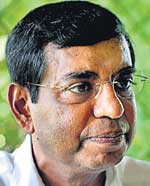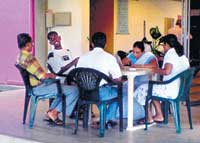
Sahanaya: Providing help beyond the family
School boys, housewives, businessmen – mental illness, it seems, does not limit itself to any age, gender or socio-economic group. While many recover completely, a few will discover that surviving the aftermath of a long term mental illness is long and arduous; attaining normalcy - with all the demands and expectations that accompany it - may seem impossible. The result is tremendous strain not only on both patient and family, but also on a healthcare system straining to cope.
Sahanaya, The National Council for Mental Health, has embraced the challenge, and taken their commitment one step further with the recent launch of the Sahanaya Resource Centre in Gorakana. “This facility was originally designed as a residential facility for people who had recovered partially from mental illnesses,” explains Prof. Nalaka Mendis, President of Sahanaya, adding that “this group of people are left with certain disabilities.” Individuals who have struggled with schizophrenia over the long term, for example, may recover only partially, he says, explaining that in such cases they may have difficulty in concentrating, coping with social interactions, holding down a job and remaining solvent. Some may even find themselves defeated by the task of adequately caring for their own needs on a day-to-day basis. “We think that there may be 25,000 to 30,000 such people in this country,” says Prof. Mendis, revealing that in the absence of a support structure, this group must necessarily lean, and lean heavily, on their families. “The families themselves may not be able to cope,” he says. Even if the family can afford to pay, which in many cases it can’t, good quality care is hard to come by, and in itself does not offer a long term solution. Institutions, ranging from national and provincial hospitals to private ones, do their best to stem the breach, but their facilities tend to be limited, says Prof. Mendis, explaining that inevitably, the recovering patient’s quality of life is adversely impacted. The solution, it becomes apparent, is not as simple as providing them with some place to stay for the rest of their lives. Instead, Sahanaya’s ambitious goal is to empower them so that they can once again be independent, fully contributing members of society. The organisation intends to run three programmes at their beautiful facility at Gorakana. The first, an assessment area, will offer a complete assessment of any patient who visits the centre, including the level of disability, what treatments are available and advice on how to minimise any associated problems for the patient and the family.
The second programme is aimed at skills development and will possibly include sheltered workshops, says Prof. Mendis. Ranging from essential life skills, to job skills and recreational activities, this programme is a key part of Sahanaya’s vision. The third component is the residential facility or hostel. Though patients will not be able to stay for more than a few months, the service is designed to offer families a break, even as its structured environment is designed to inculcate some degree of discipline in a patient who may otherwise be reluctant to get out of bed, or stick to routine, says Prof. Mendis. Though the residential facility can hold only a limited number of patients, perhaps only 20 at a time, out-patients will be encouraged to make full use of the assessment clinic and the skill development programme. Much of the facility’s success depends on community support. Patients will only live there for a few months while they learn basic skills, after which they must return home and attempt to pick up the threads of their lives. Moreover, none of this is free. However, Sahanaya hopes to accommodate those who cannot afford to pay through third party payments and sponsorships. While the clinic is already open for business, the centre itself will only be fully operational early next year. Currently, Sahanaya is on the lookout for individuals to form the first batch of residents at the Gorakana facility and they welcome those interested to contact them. |
|| Front
Page | News | Editorial | Columns | Sports | Plus | Financial
Times | International | Mirror | TV
Times | Funday
Times || |
| |
Reproduction of articles permitted when used without any alterations to contents and the source. |
© Copyright
2007 Wijeya
Newspapers Ltd.Colombo. Sri Lanka. All Rights Reserved. |

